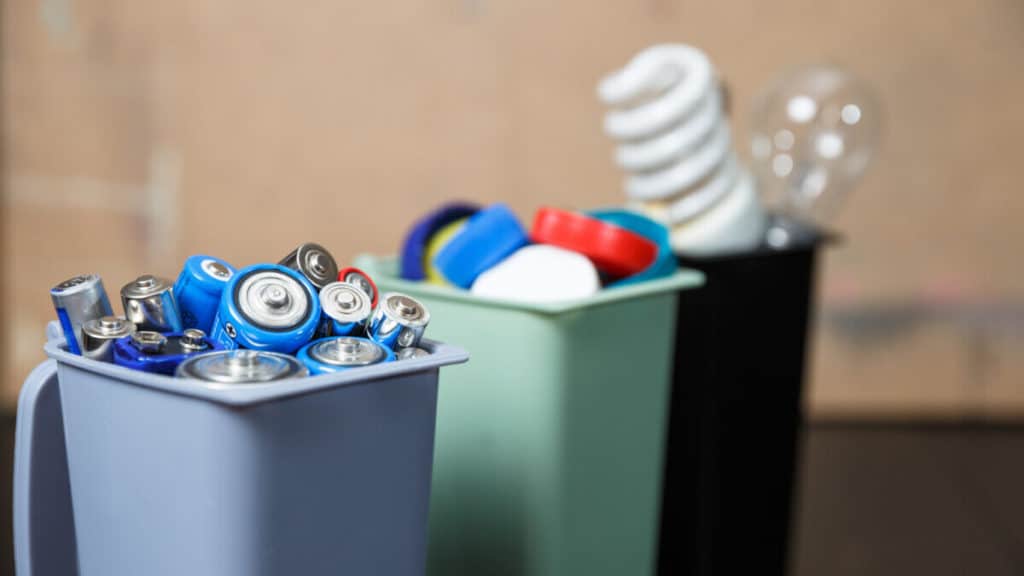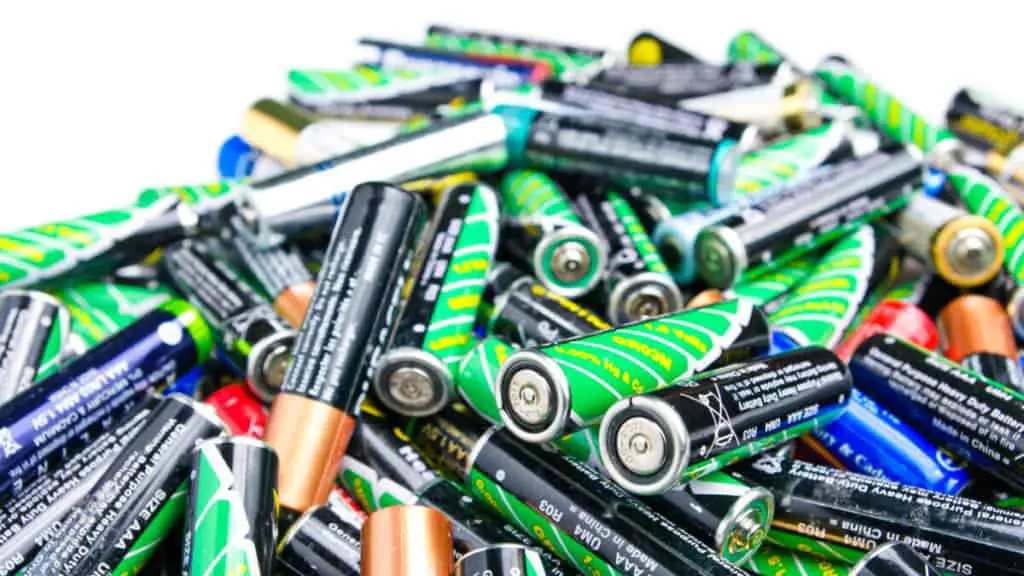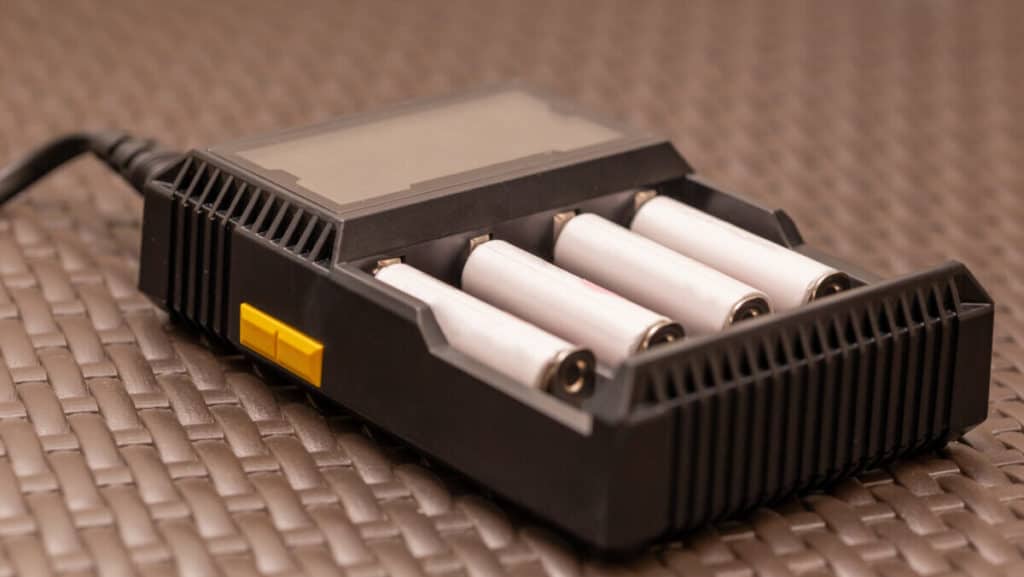
In our everyday life, we are constantly using batteries in just about everything that we do. Phones, computers, remotes, electric tools, and more, anything that needs electricity in order to function has a battery of some kind. But like with every piece of electronic, over time it will slowly stop working, even if it is a rechargeable battery, so what do you need to do to dispose of old batteries?
To dispose of old batteries, take the old batteries to a battery recycling location. There, they will be able to safely dispose of the dangerous materials and reuse as much of the battery as possible. For specific questions, contact the local waste authority for extra details.
However, when it comes to batteries there are a massive variety of different types and each will have its own disposal methods. Bellow, I will cover each type of battery and how they are typically used so that you will know which one you will be dealing with and how to properly dispose of them. And while most states don’t have any specific laws about battery disposal, I will cover which ones do and what they are.
Alkaline and Zinc-Carbon Batteries

These are the most common batteries that you are going to have to deal with. These are the single-use AA, AAA, 9 volts, C, and D batteries that are used in just about everything that uses batteries. From controllers, remotes, video cameras, two-way radios, children’s toys and most anything that you are constantly replacing batteries in are most likely using alkaline or zinc-carbon base batteries.
When it comes to disposing of these batteries it is very simple. In just about every community in the United States, you can just throw them into the trash. Another option available is to take the batteries to a battery drop-off location where they can take them a recycle the batteries to save materials. However, it is safe to dispose of these batteries by just placing them in your trash. (Source)
Button-Cell or Coin Batteries
These are the small circular batteries that look like buttons or coins, hence the name. These batteries are most commonly found in watches, hearing aids, calculators, and keyless car entry remotes. And when it comes to recycling these batteries, check the below list to make sure you don’t live in a state that requires these batteries to be disposed of in a particular method.
First, if you are storing these batteries up before recycling them, make sure to keep them out of reach of children since they are a choking hazard. So while you can place these batteries in the trash, since most have metals like silver, cadmium, or mercury, it is best to take these matters to a battery drop-off point or a recycling center so that they can safely dispose of the batteries without causing any environmental damage.
Lithium Single Use Batteries
The last type of single-use batteries that are commonly used are lithium batteries and they can look like either of the other two single-use batteries, but they have the word lithium printed on them for easy identification. These batteries are used for things like smoke detectors, handheld video games, watches, and cameras.
When it comes to disposing of lithium batteries you need to be careful since they cannot be placed in the trash or recycling bins. To dispose of them, you will need to go either to a battery drop-off point that accepts lithium batteries or to your nearest recycling center.
When you are disposing of these batteries, place them into separate plastic bags or place electric tape over both the positive and negative ends of the batteries to prevent any accidental fires. This is because while they don’t have enough energy to power devices, the ends touching can create a spark which can lead to a fire. (Source)
Nickel-Cadmium Rechargeable Batteries
Nickel-cadmium rechargeable batteries are the ones that usually look just like AA or AAA batteries, but you are able to recharge them, meaning they last longer. Most often these batteries are in the same ways that alkaline or zinc-carbon batteries, but they also can be used in cordless power tools, cordless phones, digital and video cameras, and some medical equipment.
When your nickel-cadmium batteries can no longer hold a charge and support whatever way you’re using them, you have to dispose of them in a specific way. You have to either take them to a special battery recycling center, battery drop-off centers, or depending on where you live, to a local hazardous waste collection service. This website can help you find your local recycling center.
Lithium-Ion Rechargeable Batteries

Not many objects tend to use lithium-ion rechargeable batteries anymore so you are most likely to find them in older objects. They will commonly be found in computers, power tools, digital cameras, children’s toys, large and small appliances, tablets, and e-readers. These batteries are often very difficult to remove from the device and can become a fire hazard if they are broken, bent, or crushed.
So, when it comes time to dispose of these batteries, you will need to take them to a certified electronic recycler and they will be able to safely remove the battery. If you don’t have a certified electronic recycler near you, these batteries can be taken to hazardous waste collection sites as well. This website will help you find local recycling centers that can recycle these batteries.
Nickel Metal Hydride Rechargeable Batteries
Nickel metal hydride batteries are very similar to nickel-cadmium batteries, however, nickel-cadmium batteries are far more common, so it isn’t extremely likely that you are going to encounter nickel-metal hydride batteries very often. Most often, they are going to be found in cellphones, cordless phones, cordless power tools, two-way radios, and digital cameras.
Because these batteries are so similar to nickel-cadmium batteries, they are disposed of in the same ways. You can either take them to a special battery recycling center, battery drop-off center, or a hazardous waste collection service. Also, make sure when you are storing these batteries, do so in separate bags or place tape over the positive and negative ends in order to prevent accidental fires.
Nickel Zinc Rechargeable Batteries
The last of the nickel-based batteries is the nickel-zinc rechargeable batteries and they are most commonly used in small electronics. You are most likely going to encounter these batteries in digital cameras, wireless keyboards, wireless mice, and other small electronics that you can recharge.
When it comes to disposing of these batteries, it will need to be at a special battery recycling center or at a battery drop-off point that accepts this kind of battery. You can also get in contact with the location that provided the batteries, as oftentimes they also must provide a place to deposit old batteries. (Source)
Small Sealed Lead Acid Rechargeable Batteries
These batteries most often look like smaller versions of car batteries. This is because cars use the same type of batteries, just in larger forms. These batteries are often found on electric scooters, children’s toy cars, emergency lighting, and also some hospital equipment. they sometimes will also be used as backup power for residential landlines and power supplies for computers
The easiest way to dispose of a battery like this is to take it to an auto parts store since they will have similar batteries and it is beneficial for them to get these batteries recycled properly. You typically can also recycle these batteries at Lowes or a Home Depot for the same reasons as the auto parts store. You also can take them to a recycling center or use a paid recycling service, which typically charges you a small fee and will then safely dispose of and recycle the battery.
Lead-Acid Automotive Batteries
These are your standard car batteries and are just the larger version of the small sealed lead-acid batteries. These batteries can be found in cars, golf carts, all-terrain vehicles, motorcycles, wheelchairs, boats, snowmobiles, and other large vehicles.
When disposing of these be careful since they contain up to 18 pounds of lead and usually about a gallon of corrosive lead-contaminated sulfuric acid. So, to dispose of them just take them back to your local auto parts store, local hazardous waste center, or whoever sold the battery to you as a business must accept them and then get the batteries recycled safely. (Source)
Medium and Large Scale Lithium-Ion Automotive Batteries
This is the type of battery that more and more types of cars have started using since cars have started to be more hybrid gas and electric. So, while these batteries are most likely going to be found in cars, they can also be found in energy storage systems in some buildings.
When it comes to disposing of these batteries, you can’t as they can’t be removed by a consumer. In order to get them recycled and replaced, you must get in contact with either the auto shop dealer, shop, or salvage yard where you got the battery or the company that installed the battery.
State Laws on Battery Disposal
The laws regarding disposing of batteries vary by the state you live in. The information below will help you easily determine what your state’s laws regarding battery disposal are.
| State | State Laws on Battery Disposal |
|---|---|
| Alabama | Does not have any state battery laws in place |
| Alaska | Does not have any state battery laws in place |
| Arizona | Does not have any state battery laws in place |
| Arkansas | Cannot place Lead Acid batteries into the trash (More info) |
| California | Must recycle single-use batteries (More Info) |
| Colorado | Does not have any state battery laws in place |
| Connecticut | Must recycle all batteries |
| Delaware | Does not have any state battery laws in place |
| Florida | Coin Batteries cannot be placed in the trash (More Info) |
| Georgia | Does not have any state battery laws in place |
| Hawaii | Cannot place Lead Acid batteries into the trash |
| Idaho | Does not have any state battery laws in place |
| Illinois | Does not have any state battery laws in place |
| Indiana | Must recycle Lead Acid batteries |
| Iowa | Coin Batteries cannot be placed in the trash |
| Kansas | Does not have any state battery laws in place |
| Kentucky | Cannot place Lead Acid batteries into the trash |
| Louisiana | Cannot place Lead Acid batteries into the trash |
| Maine | Coin Batteries cannot be placed in the trash |
| Maryland | Coin Batteries cannot be placed in the trash (More Info) |
| Massachusetts | Does not have any state battery laws in place |
| Michigan | Does not have any state battery laws in place |
| Minnesota | Batteries must be recycled (More Info) |
| Mississippi | Cannot place Lead Acid batteries into the trash (More Info) |
| Missouri | Does not have any state battery laws in place |
| Montana | Does not have any state battery laws in place |
| Nebraska | Does not have any state battery laws in place |
| Nevada | Does not have any state battery laws in place |
| New Hampshire | Coin Batteries cannot be placed in the trash |
| New Jersey | Coin Batteries cannot be place into trash (More Info) |
| New Mexico | Cannot place Lead Acid batteries into the trash |
| New York | Sellers of batteries must also collect them to recycle (More Info) |
| North Carolina | Cannot place Lead Acid batteries into the trash (More Info) |
| North Dakota | Cannot place Lead Acid batteries into the trash |
| Ohio | Does not have any state battery laws in place |
| Oklahoma | Does not have any state battery laws in place |
| Oregon | Does not have any state battery laws in place |
| Pennsylvania | Does not have any state battery laws in place |
| Rhode Island | Does not have any state battery laws in place |
| South Carolina | Cannot place Lead Acid batteries into the trash |
| South Dakota | Cannot place Lead Acid batteries into the trash |
| Tennessee | Does not have any state battery laws in place |
| Texas | Cannot place Lead Acid batteries in the trash (More Info) |
| Utah | Cannot place Lead Acid batteries into the trash |
| Vermont | Coin Batteries cannot be placed in the trash (More Info) |
| Virginia | Cannot place Lead Acid batteries into the trash |
| Washington | Does not have any state battery laws in place |
| West Virginia | Cannot place Lead Acid batteries into the trash (More Info) |
| Wisconsin | Cannot place Lead Acid batteries into the trash (More Info) |
| Wyoming | Cannot place Lead Acid batteries into the trash |
Related Topics:
If you like the article above, here are some other similar articles you should check out!
What Should I Do with an Old iPod?
